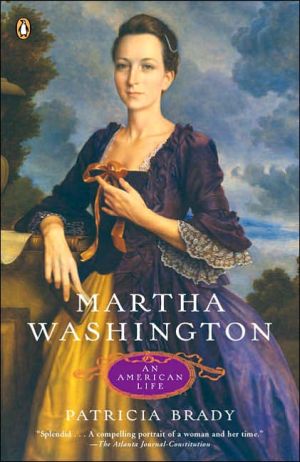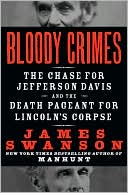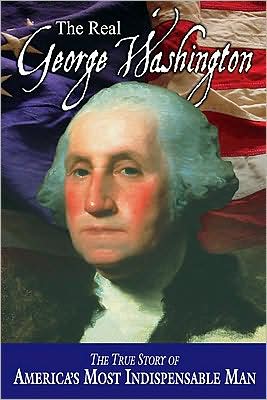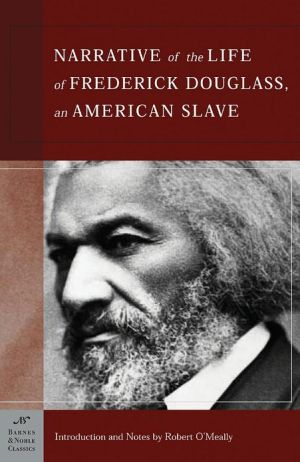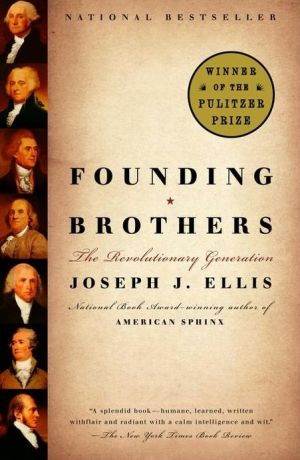Martha Washington: An American Life
With this revelatory and painstakingly researched book, Martha Washington, the invisible woman of American history, at last gets the biography she deserves. In place of the domestic frump of popular imagination, Patricia Brady resurrects the wealthy, attractive, and vivacious young widow who captivated the youthful George Washington. Here are the able landowner, the indomitable patriot (who faithfully joined her husband each winter at Valley Forge), and the shrewd diplomat and emotional...
Search in google:
With this revelatory and painstakingly researched book, Martha Washington, the invisible woman of American history, at last gets the biography she deserves. In place of the domestic frump of popular imagination, Patricia Brady resurrects the wealthy, attractive, and vivacious young widow who captivated the youthful George Washington. Here are the able landowner, the indomitable patriot (who faithfully joined her husband each winter at Valley Forge), and the shrewd diplomat and emotional mainstay. And even as it brings Martha Washington into sharper and more accurate focus, this sterling life sheds light on her marriage, her society, and the precedents she established for future First Ladies. Publishers Weekly The portrait of the beautiful, elegant young woman on the cover of this excellent biography will stun anyone used to seeing pictures of Martha Washington as a white-haired, matronly woman. And in a richly woven tapestry of social history and biography, historian Brady re-creates the 18th-century world of wealthy Virginia planters into which the elegant Martha, n e Dandridge, was born and the "joyful duet" of her marriage to America's first president. Though born to wealth, Martha (1731-1802) was well schooled in domestic skills-from killing and plucking fowl to preserving fruits and vegetables- and the expected social graces. Just before she turned 19, Martha married Daniel Custis-whose father initially opposed the union, but Martha managed to persuade him otherwise-and moved to his large plantation, where she raised their two children until Custis's death in 1757. Two years later, as the owner of Custis's vast estate, she married George Washington and became the wife of a young colonel whose ambitions and military and political ingenuity catapulted him into the leadership of the colonies and later the republic. Devoted to George, Martha accompanied him on his sojourns during the Revolutionary War, and her considerable social skills were crucial in helping her husband navigate the difficult political waters of the presidency. Brady's splendid biography offers a compelling new portrait of this passionate, committed founding mother who has unjustly been obscured by others, such as Abigail Adams. (June 27) Copyright 2005 Reed Business Information.
Martha Washington Prologue: On the Road to History\ One: Little Patsy Dandridge\ Two: Courtship\ Three: Young Mrs. Custis\ Four: The Widow Custis and Colonel Washington\ Five: Gentry Life at Mount Vernon\ Six: Lady Washington and the American Revolution\ Seven: Valley Forge and Eventual Victory\ Eight: Mount Vernon and a New Family\ Nine: The President's Lady\ Ten: The Torments of the Second Term\ Eleven: "Under Their Vine and Under Their Fig Tree"\ Twelve: The Widow Washington\ Epilogue: The Real Martha Washington\ Acknowledgments Notes Bibliography Index
\ From Barnes & NobleFor most of us, Martha Washington has always been simply a frumpy old woman in a mobcap. The wife of George Washington has been justifiably assigned a supporting role to her Founding Father spouse. Few of us know anything about their 40-year marriage or her role as America's first first lady. Drawing on a variety of scattered primary sources, Patricia Brady fills that gap, presenting Martha as a flesh-and-blood Founding Mother.\ \ \ \ \ Publishers WeeklyThe portrait of the beautiful, elegant young woman on the cover of this excellent biography will stun anyone used to seeing pictures of Martha Washington as a white-haired, matronly woman. And in a richly woven tapestry of social history and biography, historian Brady re-creates the 18th-century world of wealthy Virginia planters into which the elegant Martha, n e Dandridge, was born and the "joyful duet" of her marriage to America's first president. Though born to wealth, Martha (1731-1802) was well schooled in domestic skills-from killing and plucking fowl to preserving fruits and vegetables- and the expected social graces. Just before she turned 19, Martha married Daniel Custis-whose father initially opposed the union, but Martha managed to persuade him otherwise-and moved to his large plantation, where she raised their two children until Custis's death in 1757. Two years later, as the owner of Custis's vast estate, she married George Washington and became the wife of a young colonel whose ambitions and military and political ingenuity catapulted him into the leadership of the colonies and later the republic. Devoted to George, Martha accompanied him on his sojourns during the Revolutionary War, and her considerable social skills were crucial in helping her husband navigate the difficult political waters of the presidency. Brady's splendid biography offers a compelling new portrait of this passionate, committed founding mother who has unjustly been obscured by others, such as Abigail Adams. (June 27) Copyright 2005 Reed Business Information.\ \ \ Library JournalThis solid, scholarly biography, based on published primary sources and manuscript collections, transforms Martha Dandridge Custis Washington from a stodgy historical figure into a charming and vibrant woman. She is depicted as a very human but true heroine who remained steadfast through personal adversity and the uncertainties of war and revolution. The narrative is skillfully set within the context of both daily life and the political intrigues of 18th-century America. Brady, a former director of publications at the Historic New Orleans Collections, stays close to the documentary sources, dismissing the speculation about interracial liaisons in the Custis and Washington families explored in recent works such as Helen Bryan's Martha Washington: First Lady of Liberty and Harry Wiencek's An Imperfect God: George Washington, His Slaves, and the Creation of America. Martha's faults, including an unquestioning acceptance of slavery, are not ignored, but this is essentially an admiring biography that focuses on her indomitable spirit and her considerable influence as George Washington's wife and confidante. This work joins Bryan's book as one of only two full-length biographies of Martha Washington published in the past 40 years. Highly recommended for public and academic libraries.-Linda V. Carlisle, Southern Illinois Univ., Edwardsville Copyright 2005 Reed Business Information.\ \ \ \ \ Kirkus ReviewsIn a short, admirable biography, Brady-who has edited several books about Nelly Custis Lewis, Martha Washington's granddaughter-recreates the life and loves of America's original first lady. George Washington was not Martha's first husband. At 18, Martha-or Patsy, as friends and family often called her-married Daniel Custis, an older man from New Kent County who deeply loved Martha, and took her as his bride despite his father's controlling opposition. She came into a huge estate when Custis died, and proved an efficient and decisive businesswoman. The dashing George Washington then courted the young widow, though surviving letters reveal that he was deeply infatuated with another woman, Sally Cary Fairfax. Still, Brady is at pains to insist that George felt some affection or esteem for Martha, that he didn't marry her just for her money. Whatever the case, Martha was certainly smitten with George, and, Brady writes, the pair grew into a deeper love over the course of their marriage. Martha would recall the years at Mount Vernon before the Revolution as the couple's "golden years." But politics intervened. During the pre-Revolutionary boycotts of British goods, Martha had to scramble to make sure her household had sufficient windowpanes and cloth. Then came the war, and a whirlwind political career. She found being first lady somewhat tedious-she disliked having to fuss constantly over her hair and clothes. Still, she did much to shape the office, insisting that she was a hostess and a public servant, not a queen. Brady offers a fascinating discussion of the ways Washington's biographers have caricatured Martha-creating, for example, a "timid" wife who wouldn't risk overshadowing herhusband. Brady corrects that picture without going too much toward the other extreme. Her Martha is not a protofeminist, and she doesn't attempt to cover up her subject's warts (she is quite frank, for example about Martha's failure to share her husband's "certainty that slavery was wrong"). Engaging study of a vibrant woman.\ \
